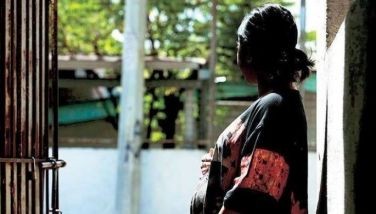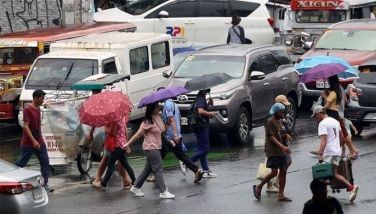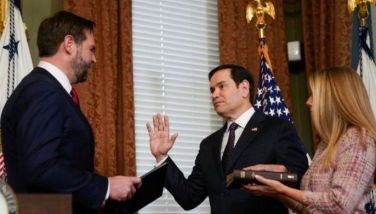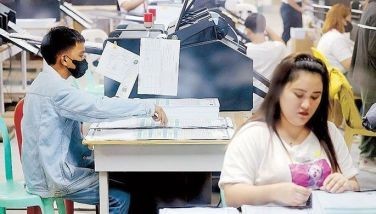Cuba seeks RP’s help in extraditing terrorist
May 29, 2005 | 12:00am
In a plot that would fit in a Tom Clancy novel, the Cuban government has sought the help of the Philippines as an ally of the United States to help in the extradition of a former operative of the Central Intelligence Agency (CIA).
Cuban Ambassador Jorge Rey Jimenez told a news conference yesterday that Luis Posada Carriles fled to the US in 1985 while awaiting sentence in Venezuela for bombing a Cuban passenger airplane.
Jimenez said Posada is wanted for bombing several tourist destinations in Cuba and for the planned assassination of Cuban President Fidel Castro and Panamanian students during the Ibero-American summit held in Havana in 2001.
Posada, a Cuban national, came to international attention when he sought political asylum in the United States only on April 13, 2005. He managed to sneak into the US through the Mexican border.
Cuba has repeatedly requested the extradition of Posada after he was tried and convicted in absentia on terrorism charges.
The Venezuelan government also wants to retry the Cuban for his role in the 1976 airline bombing.
Last May 3, the Venezuelan Supreme Court approved an extradition request against Posada. On the same day, US officials said Posada may not be in the United States, adding the charges of terrorism against him "may be a completely manufactured issue."
Reports quoted US State Department official Roger Noriega as claiming the US government is "not interested in granting him asylum."
Jimenez explained the Philippine government is in a position to help out with the extradition of Posada. The Philippines is currently heading the Anti-Terrorism Committee of the United Nations Security Council (UNSC) and chairs the anti-terrorism task force of Asia Pacific Economic Cooperation (APEC), which has the United States as one of its prominent members.
Jimenez said the Philippine government could be of big help in the extradition effort being in the position to convince the US as an ally in the global anti-terror campaign.
He said Cuba and the Philippines "share the dreams for a country that is free from intervention of foreign powers."
Meanwhile, Department of Foreign Affairs (DFA) spokesman Gilberto Asuque said Cuba’s extradition request to the Philippine government will be discussed by the DFA’s Office of American Affairs tomorrow.
"The Cuban ambassador should pass it through diplomatic channels and have proper representation with the DFA," Asuque said.
On the other hand, the Cuban embassy in Manila issued a statement yesterday claiming Posada was under the employ of the US government and working in the White House.
They said efforts to extradite Posada were being blocked by the so-called Cuban-American Mafia based in Miami, Florida.
According to Jimenez, Posada planned the terror attack against the Cubana Airlines in October 1976 that killed 73 passengers and crew members while flying over Barbados.
He claimed Posada, along with another suspect, Orlando Bosch, conceived the terror attack with the help of the CIA.
The Cuban government presented supposedly declassified US government documents showing that Posada was on the CIA payroll from the 1960s until 1976.
"It is essential to ensure that the perpetrators, organizers and sponsors of terrorist acts and actions, as well as all those who support or finance it, are arrested, prosecuted and extradited," Jimenez said.
"That is the only way this scourge can be completely eradicated and the only way to pay homage to its victims everywhere," he said.
Jimenez claimed the US government, through the US Department of Justice, issued a statement on June 23, 1989, pointing to Posada as a primary suspect in the 1976 bombing of a Cuban airline.
"Their responsibility for blowing up the Cuban aircraft and killing, in cold blood, all the passengers and crew is known to the United States government, which possesses information," he said.
Posada reportedly withdrew his asylum appeal and was moving to sneak out of the US when he was arrested on suspicion of terrorism.
Posada’ arrest, however, presents diplomatic problems as his extradition is being sought by both Cuba and Venezuela, neither of which country is a close US ally.
In the same news conference held at the Cuban embassy grounds in Makati City, the Philippines-Cuba Friendship Association (Amistad) expressed their support for the extradition of Posada.
Amistad president George Aseñero pointed out the US government is violating its extradition treaty with Venezuela and betraying its vow against global terrorism.
"By harboring criminals and terrorists like Posada... the US government continues to bully Cuba, especially since it has withstood 45 years of US-led economic blockade, black propaganda and terrorist attacks intended to topple the government of Fidel Castro and to regain control of the former US colony," Aseñero said.
Amistad pointed out the Philippine government plays a lead role as it chairs two international bodies fighting terrorism.
Cuban Ambassador Jorge Rey Jimenez told a news conference yesterday that Luis Posada Carriles fled to the US in 1985 while awaiting sentence in Venezuela for bombing a Cuban passenger airplane.
Jimenez said Posada is wanted for bombing several tourist destinations in Cuba and for the planned assassination of Cuban President Fidel Castro and Panamanian students during the Ibero-American summit held in Havana in 2001.
Posada, a Cuban national, came to international attention when he sought political asylum in the United States only on April 13, 2005. He managed to sneak into the US through the Mexican border.
Cuba has repeatedly requested the extradition of Posada after he was tried and convicted in absentia on terrorism charges.
The Venezuelan government also wants to retry the Cuban for his role in the 1976 airline bombing.
Last May 3, the Venezuelan Supreme Court approved an extradition request against Posada. On the same day, US officials said Posada may not be in the United States, adding the charges of terrorism against him "may be a completely manufactured issue."
Reports quoted US State Department official Roger Noriega as claiming the US government is "not interested in granting him asylum."
Jimenez explained the Philippine government is in a position to help out with the extradition of Posada. The Philippines is currently heading the Anti-Terrorism Committee of the United Nations Security Council (UNSC) and chairs the anti-terrorism task force of Asia Pacific Economic Cooperation (APEC), which has the United States as one of its prominent members.
Jimenez said the Philippine government could be of big help in the extradition effort being in the position to convince the US as an ally in the global anti-terror campaign.
He said Cuba and the Philippines "share the dreams for a country that is free from intervention of foreign powers."
Meanwhile, Department of Foreign Affairs (DFA) spokesman Gilberto Asuque said Cuba’s extradition request to the Philippine government will be discussed by the DFA’s Office of American Affairs tomorrow.
"The Cuban ambassador should pass it through diplomatic channels and have proper representation with the DFA," Asuque said.
On the other hand, the Cuban embassy in Manila issued a statement yesterday claiming Posada was under the employ of the US government and working in the White House.
They said efforts to extradite Posada were being blocked by the so-called Cuban-American Mafia based in Miami, Florida.
According to Jimenez, Posada planned the terror attack against the Cubana Airlines in October 1976 that killed 73 passengers and crew members while flying over Barbados.
He claimed Posada, along with another suspect, Orlando Bosch, conceived the terror attack with the help of the CIA.
The Cuban government presented supposedly declassified US government documents showing that Posada was on the CIA payroll from the 1960s until 1976.
"It is essential to ensure that the perpetrators, organizers and sponsors of terrorist acts and actions, as well as all those who support or finance it, are arrested, prosecuted and extradited," Jimenez said.
"That is the only way this scourge can be completely eradicated and the only way to pay homage to its victims everywhere," he said.
Jimenez claimed the US government, through the US Department of Justice, issued a statement on June 23, 1989, pointing to Posada as a primary suspect in the 1976 bombing of a Cuban airline.
"Their responsibility for blowing up the Cuban aircraft and killing, in cold blood, all the passengers and crew is known to the United States government, which possesses information," he said.
Posada reportedly withdrew his asylum appeal and was moving to sneak out of the US when he was arrested on suspicion of terrorism.
Posada’ arrest, however, presents diplomatic problems as his extradition is being sought by both Cuba and Venezuela, neither of which country is a close US ally.
In the same news conference held at the Cuban embassy grounds in Makati City, the Philippines-Cuba Friendship Association (Amistad) expressed their support for the extradition of Posada.
Amistad president George Aseñero pointed out the US government is violating its extradition treaty with Venezuela and betraying its vow against global terrorism.
"By harboring criminals and terrorists like Posada... the US government continues to bully Cuba, especially since it has withstood 45 years of US-led economic blockade, black propaganda and terrorist attacks intended to topple the government of Fidel Castro and to regain control of the former US colony," Aseñero said.
Amistad pointed out the Philippine government plays a lead role as it chairs two international bodies fighting terrorism.
BrandSpace Articles
<
>
- Latest
- Trending
Trending
Latest
Trending
Latest
Recommended































